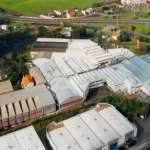Climate Change: Excluding oil and gas companies “short-sighted and political” says Galp boss
Being in completely different industries does not mean that Galp CEO Andy Brown or Microsoft President Brad Smith are not switching on to a new power reality and stepping up to the plate to go green. Quite the contrary, they see opportunities.
Text Chris Graeme
Tech giant Microsoft set out its plans for sustainability at COP26 in Glasgow this week and both its President Brad Smith and Galp – a multi-continent Portuguese oil and gas company – CEO Andy Brown reiterated their company’s plans at Web Summit to not only go carbon-free over the next five to 10 years, but get on board a green revolution which will provide opportunities, challenges and a lot of investment and cooperation between governments and the private sector.
In fact, by 2030 it will be carbon negative in terms of emissions and by 2050 it has pledged to remove all carbon that it has emitted since its founding in 1975.
Smith, speaking at a ‘fireside’ lunch in Lisbon organised by the American Chamber of Commerce in Portugal (AmCham) says that Microsoft is bringing down its carbon emissions by around 6% per year by shifting to green energy at data centres.
“We’re also engaged in carbon removal through new technology like Direct Air Capture which is machinery that runs the air through it and takes the carbon out which he admits is a bet.
Galp’s Andy Brown who was not at COP26, said the commitments made at the international climate change summit on not funding oil and gas projects are a double-edged sword. “I understand why they are doing it, but I am really concerned what will happen to the energy sector as a result.
“Governments, in my view, need to make sure that it is not just about putting commitments in place, but also providing incentives instead of the stick (without carrots) against fossil fuel producers to make a change. If we don’t get the right balance, we are going to have a crisis in the energy system”, he said.
Brad Smith, on his impressions at Glasgow – he was there on Monday and Tuesday – at the climate change conference said that people there were “realists”. “I think everybody went to Glasgow recognising that we’re moving faster towards global warming and must work towards leaving carbon behind, and the mood was determined, and we saw this in the methane and deforestation agreements, and there was a shared determination to roll up our sleeves and make progress.”
Smith said that part of this transition means moving from pledges to performance (i.e., not just talk but action). “You can’t just pledge your way out of this problem, you’ve actually got to perform and that requires a balance between carrots and sticks when it comes to governments’ policies. From our perspective, you’d better have effective measurements, as you can’t manage something unless you can measure it”, he warned.
“If we don’t have standardised measurements, we’ll all believe we are doing better because we’re working harder, but until we have everything in place on the measurement side we won’t have the foundations for what we need to succeed,” said the Microsoft president.
OIL AND GAS COMPANIES “NOT WELCOME”
What Andy Brown finds disturbing is that oil and gas companies “aren’t welcome” when it comes to events like COP26
“I find that difficult, because our energy system will not change just through renewable energy. It will require biofuels, hydrogen and carbon capture storage. The only companies best placed to actually put these in place are the oil and gas companies. So why exclude them?” “It seems so short-sighted and politically motivated.”
While the Galp CEO says that politically motivated attitudes are not going to bring about a solution, the President of Microsoft pointed out that the world is going to need to produce more energy by 2050, not less.
“You really cannot increase prosperity without increasing energy use. You can make things more energy efficient. We face a massive need to increase energy production at the same time as we reduce carbon emissions and that is a challenge,” said Brad Smith.
RENEWABLES AND LITHIUM
Andy Brown revealed that 50% of Galp’s investment (between €800 million and €1Bn) will be going on renewables and low carbon solutions and Galp will reduce its own emissions by 40% by 2030. The energy it produces will reduce carbon intensity by 40% by 2030.
“We will do this by building a renewable energy portfolio We’re the third largest solar energy producer in Iberia, generating 12GW by 2030 and we are going to invest heavily in green hydrogen mainly because we want to change our refinery in Sines from a fossil fuel based energy park to a green park with hydrogen based and bio fuels, and that is a long-term transition”.
The Galp boss also says the company wants to invest in a battery value chain. “Portugal is the No1 lithium source in Europe, it’s very controversial but this is an opportunity; an opportunity for a new industry in Portugal, and an opportunity for Europe to have an end-to-end value chain for something that is probably going to grow 10-fold over the next 10 years”, he explained.
EV CHARGING & DATA CENTRES
Galp is also the largest company in Portugal for Electric Vehicle Charging (EV) and has plans to roll out more EV charging and renewable electricity. “This is our ambition and we know there is going to be a massive change, and Galp will have to go into completely new areas, be more agile, digitally enabled and more open to innovation in order to create the solutions that are needed.
“The energy system is going to have to completely change, and renewables are clearly a big step forward, but that’s only the start. We haven’t touched the hard to bake sectors to make green steel and cement,” said Andy Brown. “This is a complete energy system revolution and Galp wants to be part of it”.
So what is Microsoft doing as far as its part to reducing its carbon footprint? Brad Smith admits the company’s job is so much easier in this respect than Galp’s. He says that by 2030 the company will be carbon negative, water positive and zero waste.
“The biggest issue for a company like Microsoft is our data centres when it comes to carbon. We have an extraordinary number of data centres around the world which are measured by the amount of electricity they consume.
“We have a couple of Gigawatts produced by data centres in country after country around the world and we’ve pledge to get all of them 100% renewable by 2025. What that really means is that we will have power purchase agreements in every country so that we are purchasing on the grid from renewable energy that is equal to the power we consumer in those data centres,” explained the President of Microsoft, Brad Smith.










